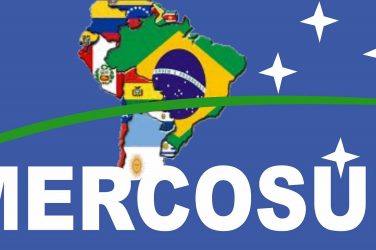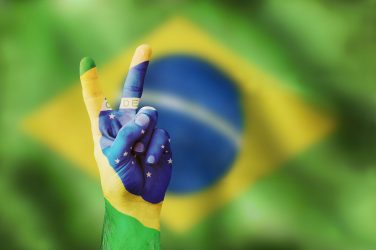An expert businessman undertakes an overall assessment of Brazil, its people,
its economy. There has never been a better time or better reasons to be optimistic
about the future, he concludes.
This is a review of a paper written by Saïd Farhat for
several customers of Semprel, his lobbying company. Farhat prepared
it in English for the benefit of his clients who couldn’t
speak Portuguese but have huge interests in Brazil. A longtime
Federal civil servant, Farhat began his career with the Brazilian
Geographical and Statistical Institute (IBGE), in the country’s
remote Northwestern territory of Acre, now a full-fledged
State (IBGE is Brazil’s census bureau).
When he was done with the IBGE, he joined a major
Brazilian advertising company where he designed and directed
public opinion surveys and later managed agency offices in
London and elsewhere. After a stint as an executive of the
Vision Publishing Group, he acquired its
Visão magazine whose publisher and editor he became; several of his editorials earned
him the animosity of the Army brass at a difficult time of the
military dictatorship (that ruled Brazil from 1964 to 1983).
With the sale of Visão, Farhat felt free to offer his
remarkable social and political talents to a presidential candidate,
General João Batista Figueiredo as a PR adviser. He managed to
change radically Figueiredo’s image, carving for him a civilian
niche and placing him much closer to the Brazilian electorate.
When Figueiredo was elected, the last Army general to serve as
president, Farhat was appointed Minister of Communications and
did a commendable job, but again got on the wrong side of the
armed forces which forced his resignation. After a brief political
and unsuccessful fling as a candidate to the Senate from Acre
State, Farhat established semprel.
Brazil has the fourth or fifth largest land area [3.3
million square miles] in the world, depending on how you compute
and place the territories of the former USSR. Its population is
over 160 million. According to estimates of the UN Food
and Agricultural Organization (FAO), Brazil produced 75
million tons of grains in 1994. It has 129 million acres under
cultivation, 431 million acres in grazing lands, and 348 million acres
in usable land.
In 1994, the Gross Domestic Product (GDP) of Brazil
was 450 billion dollars, of which $249 billion (55.3%) was
generated by trade and services, $156 billion (34.6%) by
manufactures, and $45 billion (10%) by agriculture.
However, as Farhat points out, the overall GDP
per capita $4.630 is practically meaningless
because of the catastrophic differences between North
and South, or more specifically SE Brazil, and NE
Brazil. In a comparison between the States of São Paulo
and Pernambuco (which is fairly prosperous in NE
terms) São Paulo takes the lion’s share with a $4,630 GDP
per capita, while Pernambuco’s is $1500. São Paulo
has 5.6 million cars and Pernambuco 601,000. The
average monthly wage of a Paulista worker is just over
$1000, while his/her Pernambucano counterpart makes
$175. The countrywide average salary is $650 per month.
Brazil, Farhat points out, is “not one, but
several countries.” He goes on to focus on this point by
lining up data from a UNICEF state-by-state study based
on the 1991 census and referring to children’s
conditions of survival and the percentages of the children in
those conditions over the total child population between
the ages from 0 to 6.
Extreme cases of (1) children in worst survival conditions are: Maranhão
73%, São Paulo 0.9%; (2) children in midpoint conditions:
Maranhão 10.8%, São Paulo 6.3%; and (3) children in better
conditions: Maranhão, 13.9%, São Paulo 92.8%.
Thus, the author argues, it is easy to see why most
businessmen, both domestic and foreign, tend to pick up
the Southeast and the South, the Brazilian areas with the
highest incomes, markets, buying power, and “well-to-do”
consumer habits. The resulting concentration of job
opportunities “further aggravates the immense gap between the
two Brazils.”
In a country where the richest 10 percent of the
population own 48 percent of the GDP, as against only 12 percent of
the GDP in the hands of 50 percent of the population, it is easy
to estimate that 14 percent of the Gross Domestic Product is
held by the richest 1 percent of the population.
Farhat does not mention it but, like in the US,
politicians in Brazil show little political will to change the picture,
balance the scales of compassion, really solve the country’s
many and extremely serious problems. Besides their
concern with their own economic interests and their anxiety over
reelection, their approach is Marie Antoinette’s: “They
have no bread? Let them it cake!”
In the absence of a desire to weld the country together,
a task that the author believes would take two generations,
the 10 million Brazilians now living “well below the poverty line” can only expect
to put up with “poverty, poor health, a shorter life
span, and fewer opportunities to improve the quality of
their lives.”
Then comes the clincher: “This [situation is]
further aggravated by the fact that the rich pay low
or virtually no taxes whilst the poor carry the heaviest
tax burden, principally disguised as `indirect’ taxes
on consumption, taxes on salaries, and other forms
of work compensation. Let’s hope Republican
Congresspeople in Washington don’t hear of this”
As a result, the essay goes on, “the rich local
and regional markets…will become richer and richer,
while the rest of Brazil…may get poorer and poorer.”
The rich local and regional markets are defined as
São Paulo City and State, the States of Minas Gerais, Rio
de Janeiro, Paraná, Santa Catarina and Rio Grande do
Sul, with the possible addition… of Mato Grosso do Sul.”
But not everything is bad
On the positive side, Farhat points out, there
has been a sizable downswing of 15.15 percent in
population growth, from 38.87 in 1980 to 12.72 percent in 1990.
This may have happened because of a decrease in the rate
of fertility: from 4 children per 100 women over 15 in
1980, to 3,7 in 1985 to 2.7 in 1990. Simultaneously,
infant mortality rates also declined from 65.8 per thousand
live births in 1980 to 51.6 per thousand in 1990. In
addition, life expectancy at birth grew from 41 years in 1940 to
62 years in 1980 to 65 years in 1990, raising the age
of Brazilians in general. Seniors over 60 years, who were
1.7 million (4.1%) in 1940 now are 10.9 million or 7.4
percent of a much larger population. On the other hand,
food production increased significantly from 56.1 million
tons of grains in 1990 to 75.2 million tons in 1994, 34.% in
five years.
Highlights:
In 1940, feeding each city dweller required the
joint effort of 2.5 farmers; nowadays, each farmer feeds
3.6 city dwellers.
From 1982 to 1992, the total cultivated area fell
by 30 percent but production of certain grains, in tons
per acre, increased by 14.9 percent.
In 12 months of stability and inflation (after
the “inflation industry taps” were practically turned off by
the present administration) the minimum monthly
wage, considered a “basic reference” for work
compensation, jumped from $68.93 in July 1994 to $108.46 in
June 1995, for a 67.4% gain. Inflation fell from an
average of 43% a month in the first half of 1994 (about
5/7,000% inflation per year) to 25/30% in 95, and is still decreasing.
The basic food basket (enough to feed a family
of four for a month) costs the same as one year ago, or
a little less.
Because the family wage as a unit has gone up, and keeps going up,
“those who were not eating now can think of eating,” said a
Northeastern worker. And the workforce has kept
relatively peaceful, although unemployment rose from 3.8%
in January 1988 to 4.5% in May 1995.
Government-owned companies formerly operating in the red have been
sold. Many are now making money and paying taxes.
After the quake that followed the Mexico financial crisis, Brazilian
reserves are recouping and now reach over $40 billion in
ready cash.
Positive foreign investments added up to $2.4 billion in the twelve-month period ending May 1995 (Central Bank data).
The per capita GDP in constant value currency grew by 10.9 percent between the first quarter of
1990 and the second quarter of 1995.
Actual GDPs, which were $35.5 billion in 1970, $444.2 billion in 1993, and $456 billion in 1994,
are projected to reach $500 billion in 1995.
Manufacture of motor vehicles increased from 966.7 K in 1985 to 1.58 million in 1994 a
63,4 percent difference, turning Brazil into the 9th
largest automotive manufacturer in the world, following
the UK with 1.6 million but ahead of Italy with
1.53 million.
Energy consumption by industry has risen from 50.2 K tEP (equivalent to tons of oil) in 1983 to 71.5
K tEP in 1993 an increase of 29.8%.
In 10 years, the foreign trade of Brazil
accounted for $521.8 billion, with a surplus of $129.3 billion.
If recent trends persist, Brazilian foreign trade will
reach $150 billion a year by 2000/01, with $75 billion a
year in export and basically the same amount in imports.
Economists forecast that if the performance of the last 10 years holds as an acceptable yardstick,
and new opportunities are added at the present pace,
the historical growth level of Brazil GDP should be
approximately 7 or 8 percent a year, as it was in the 70’s.
The present projection is for some $25 billion
to be invested in new money over the coming years. Likely attractive fields include automotive, that
has caught the eye of Peugeot and Renault from
France, Honda and Toyota from Japan, ASIA, Hyundai,
and KIA from Korea, Scania from Sweden, Ford and
GM from the US. Retail and fast food are being
considered by Carrefour from France, as well as Arby’s,
Kentucky Fried Chicken, McDonald’s, and Wal-Mart from
the US.
Food and beverages beckoning to Brazilian corporations such as Antarctica and Brahma, Unilever
from the UK, Coca-Cola, Gatorade, Pepsi, Procter &
Gamble from the US. Computer hard and software are
being considered by Samsung and Goldstar from
Korea, Apple, Compaq, IBM, and Microsoft from the US.
In the heavy industry and equipment sector there is
interest from Bosch/Siemens from Germany, Philips
from the Netherlands, ABB-Asea/Brown-Bovery from
Sweden/Switzerland, Alcoa and GE lighting from the
US. Several hundred other smaller companies and
conglomerates are also willing to invest in Brazil.
Among other fields now wide open to native and foreign investment in infrastructure are
communications (telephones, nationwide and local
networks, electronic hardware, satellite services), mail
(messenger, courier, and other services), mining, natural
gas, petroleum and derivatives, rail (equipment and
service).
The rise of double-salary families is expected
to bust open the Brazilian markets for home
appliances (automatic refrigerators, time-controlled gas
ovens, microwave ovens, dishwashers, washing machines
and dryers, small kitchen and personal appliances,
cars, computers, peripherals, and software, utility
vehicles, RV’s, motor cycles and scooters, camping
equipment, boats, holiday travel, tour packages, hotel and
catering, tour buses, cable TV, interactive TV and
radio, etc.
The increasing modernization of households in big cities is already putting a premium on good
skilled domestic servants. Middle-class couples are
learning fast to pick up the slack although begrudgingly,
and missing the hard-working, diligent Marias of
yesteryear. Commercial laundries, Laundromats, and
dry-cleaning establishments will make many Chinese rich.
Many of the reforms in the pipeline, says
Farhat, including several requiring amendments to the
Constitution, are expected to end discrimination
favoring companies established under Brazilian law, no
matter the national source of their capital.
The new legislation is expected to: abolish
government monopoly in communications and allow
private competition with the existing state-owned
systems; open the mining sector to private capitals, both
native and foreign: allow foreign ships in Brazil to
provide coastal passenger and freight services; abolish
the States monopoly in the distribution of natural gas
for residential and industrial uses; open oil
prospecting, exploiting, hauling, processing, to private
interests both Brazilian and foreign and grant them licenses
to import and export crude, subproducts, and
derivatives; change the domestic banking laws and regulations
to permit foreign capital banking corporations to
operate commercial banks and render a full range of
financial services; change the tax laws to permit “access
to individual banking records” in specific cases and
circumstances.
Already in consideration by the Brazilian
Congress are bills aiming to: reform social security and
allow participation of private companies and schemes; levy
a “health tax” on each bank deposit or withdrawal;
allow foreign corporations to operate hospitals, offer
health insurance and kindred services; prune the vast
Federal bureaucracy and give sizable rewards for
improved efficiency in the State and county management.
The net result of all the proposed changes is
to allow “regular taxpayers” to pay lower personal
taxes; rein in into the system all the now virtually
“exempt” rich people, thus broadening the country’s tax
base; raise the income tax for those on the higher
brackets and simultaneously cut corporate taxes, including
payroll taxes; emphasize direct taxation, shifting the
tax burden to consumers, with relief for producers.
Many of these measures, Farhat warns, will be fiercely
opposed in Congress.
He ends his monograph saying that the coming years will be exciting ones for those companies
who know Brazil from experience and realize that the
country “is an excellent base to manufacture, perform
services, buy and sell world-wide,” provided they
have the “intelligence to see, the managerial skills to
plan and perform,” as well as the valor to risk, the
confidence to experiment, the know-how to find the
right solutions, and the staying power to reap the fruit
of their investment and labors.












